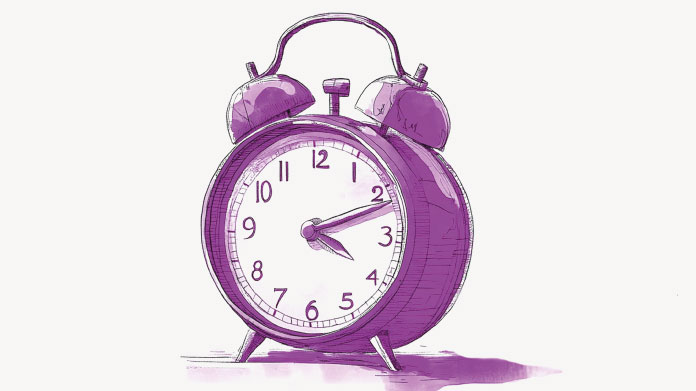
Melatonin: the sleep hormone
Produced by the pineal gland in the brain, melatonin is also known as the sleep hormone. This is because it is produced by the body to encourage drowsiness (1), as natural light fades at the end of the day.
Melatonin production peaks between 2am and 3am, before gradually falling in the hours that follow, as levels of cortisol (also known as the ‘stress hormone’) rise. As night draws to an end, the crossing of the melatonin and cortisol curves prepares the body to be roused from sleep (2).
Melatonin is thus directly related to circadian rhythms, the alternating sleep/wake phases in a 24 hour cycle: this is the famous body clock which can be disrupted, for example, by travel to other time zones or irregular working hours.
Melatonin deficiency: what are the effects?
A lack of melatonin primarily affects sleep quality:
- difficulty falling asleep;
- waking up in the night and struggling to get back to sleep;
- disrupted sleep routine (going to bed late and waking up late);
- feeling tired when you wake up;
What’s more, as melatonin is similar to serotonin (known as the ‘feel-good hormone’), a lack of melatonin can cause mood problems, exacerbated by lack of sleep: it’s a vicious circle (3).
Similarly, a lack of melatonin can have a negative impact on our libido and sex life, which can also lead to mood problems, which in turn exacerbates the sex life issues, etc: it’s another vicious circle (4).
A melatonin deficit is therefore not something to shrug off lightly: it can have a significant effect on quality of life in general.
How can you tell if you’re short of melatonin?
If you often feel tired in the morning, it could be a sign of a sleep problem, potentially one caused by a lack of melatonin.
Tests are available to measure your melatonin levels. You can even buy home testing kits on-line which involve taking saliva or urine samples at various times during the day to establish your hormone levels (cortisol and melatonin) over a 24 hour period. However, their usefulness is limited, and if you’re suffering from persistent sleep problems, it’s best to seek advice from a health professional.
Why do we lack melatonin?
As we’ve seen, melatonin and cortisol are antagonist hormones: they have opposite effects. So it’s obvious that even though high levels of stress do not directly affect melatonin levels, they can reduce its potential, and thus cause the symptoms of melatonin deficiency (5).
While melatonin levels do not necessarily decline with age, several studies have found low melatonin levels in older people as well as in those suffering from sleep problems. However, this correlation has not yet been established as a causal link (6).
Conversely, menopause-induced hormone changes have been shown to affect melatonin production (7).
Furthermore, both shift work and jet lag disrupt our body clocks, producing the same effects as a lack of melatonin. In reality, it’s more a misalignment between circadian-governed melatonin levels and an imposed shift in the timing of sleep (8-9).
Finally, chronobiologists have in recent years demonstrated the impact of light on melatonin production. Our eyes are naturally ‘programmed’ to receive blue light in the morning. As the day progresses, this light gets warmer until it reaches ‘peak warmness’ at the end of the day, as the sun goes down. It’s this organisation of light throughout the day that controls the brain’s production of melatonin (10).
As a result, exposure to blue light in the evening from computer, tablet and smartphone screens is recognised as having a direct effect on melatonin levels and sleep rhythms.
How can you increase your melatonin levels?
One of the first things to do to address a lack of melatonin, or disruption to its production, is to adjust your light exposure. Instigating a self-imposed ‘screen curfew’ in the evening should be seriously considered. Or, at the very least, installing software filters on computers, tablets and smartphones to ensure more blue light exposure in the morning and more warm light in the evening.
In addition, melatonin is synthesised by the body from an amino acid called tryptophan. To naturally boost your melatonin levels, it can therefore help to eat foods rich in tryptophan such as bananas, walnuts, almonds, hazelnuts, etc, as well as tuna, mackerel and wholegrains. (11)
Tryptophan can also be taken in the form of a dietary supplement (such as L-Tryptophan).
Last but not least, a course of melatonin supplements is often recommended to help cut the time it takes to fall asleep and alleviate the subjective effects of jet lag.
Which melatonin supplement should you take?
Melatonin in spray form
Melatonin can be taken in the form of a water and glycerine sublingual spray (such as Melatonin Spray). This under-the-tongue method of administration ensures fast, effective absorption through the oral mucosa.
Melatonin in capsule form
It’s easier to take a precise dose with melatonin capsules, (such as the product Melatonin 1mg). The recommended dose is normally 2 capsules in the evening, an hour before bed, though this dose can be adjusted if waking up is difficult. A dose of just one capsule the following week should suffice.
A synergistic formulation
There are also many individuals who benefit from synergistic formulations combining melatonin with valerian, hawthorn and hop (a plant from the same family as hemp), which promote good quality sleep, as well as passiflora and California poppy, which induce relaxation. Together, and in synergy with melatonin (as in the supplement Advanced Sleep Formula), these calming plants help to restore a better quality of sleep – and life.
6 Hours
The products I use are excel·lent
The products I use are excel·lent
ROSAS Josep Maria
8 Days
Delivery is prompt and I never saw a…
Delivery is prompt and I never saw a quality problem with the manufacturing. It is not possible to assess efficacy on a personal basis, since too many factors come into play. Efficacy can only be assessed statistically with a sufficient number of cases.
Roger De Backer
9 Days
I collaborates with the Supersmart…
I collaborates with the Supersmart more than 10 years. Every thing is going good. Quality of the things is good. Delivery comes in time. Five stars definitely !!!
Oleksiy
9 Days
All good
Simple, frictionless site, easy ordering, good delivery updates and execution.
Chris Robbins
11 Days
I feel better
I feel better
Peter Ammann
11 Days
Prompt delivery
Prompt delivery
JAKUB Radisch
13 Days
My new go-to for top quality supplements!
I am buying more and more of my supplements from this superb, high quality company. Cannot recommend it enough. Plus, excellent customer service with a quick, helpful team and speedy deliveries. Highly recommend Supersmart!
Cecilie H.
16 Days
SUPERSMART WHAT ELSE👍
SUPERSMART WHAT ELSE👍
DIEDERLE Christophe
19 Days
Excellent quality products with…
Excellent quality products with innovative formulas, as someone who has been suffering with acid reflux, these supplements have been lifesavers.
Oriana Moniz
19 Days
high quality supplement!
high quality supplement!
GALANT
20 Days
Good service prompt delivery
Good service prompt delivery
Mrs Marcella Reeves
25 Days
I like your clear explanation
I like your clear explanation. And how to make a choice of products for a specific health problem
Ingrid
31 Days
Great product and it arrives quickly.
Great product and it arrives quickly.
SOMMARIVA Gianni
32 Days
Excellent products and fast service.
Excellent products and fast service. What do we need more?
Margarida
36 Days
The variety of products is amazing
The variety of products is amazing, the offers are good and the sending is very fast. I just miss having a bit more of guidance about combinations, possible interactions, etc.
Maria Angeles Verdu





